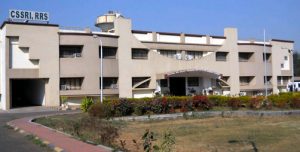
Central Soil Salinity Research Institute (ICAR)
Regional Research Station, Maktampur P.O. Bharuch 392 012 (Gujarat)
Salinity of soil and water is a major constraint in our ability to ensure food security. Salinity problems are increasing at an alarming rate, more particularly in the irrigation command areas and coastal area. About 2.22 Mha of area in Gujarat state alone has already gone out of cultivation due to waterlogging and salinity/sodicity. Black cotton soils (Vertisols) due to their inherent physicochemical characteristics such as poor hydraulic conductivity, low infiltration rate, high clay content and narrow workable moisture range pose serious problems for arable farming. About 0.12 Mha of salt affected black soils (Vertisols) in Gujarat has been exhibiting the problems of low soil and crop productivity. Seawater ingress and the marine influence create high salinity situations in the coastal regions. Resource characterization, generating database on saline/sodic and saline waterlogged soils, its delineation and mapping, evolving technically feasible agro-management strategies and their dissemination to the end-users/clients are the vital needs for bringing these problematic soils under productive utilization.
SETUP
The station was established at Anand, Gujarat in February, 1989 and subsequently shifted to Bharuch, Gujarat in April 2003 and started functioning at Bharuch since then. The research farm measuring about 23.5 ha at Samni village (Amod taluka of Bharuch district) was acquired on lease from the State Government in 2001, with true Vertisols falls at the periphery of Bara tract (21o40´ to 22o13´ N latitude and 72o32´ to 72o55´ E longitude) with salinity problems prevailing at the sub-surface horizons of soil profile. The Station has fully functional laboratory with facilities for soil, water and plant analyses and research farm for conducting field trials. The station has been working on evolving technologies for addressing the issues pertained to management of salinity of soils and irrigation waters and also using industrial wastes in agriculture, rainwater harvesting and groundwater recharging. The mandate of the station is given below.
MANDATE
- To undertake basic and applied research on
- Survey and characterization of salt affected Vertisols and associated soils and poor quality waters;
- Generating cost-effective technologies for the management of salt affected Vertisols and associated soils;
- Evolving strategies for efficient use of salty waters for crop production;
- To impart training to farmers and other user-agencies;
- To provide consultancy in the management of salt affected Vertisols and associated soils and poor quality waters and industrial effluents.
THRUST AREAS
- Identification and characterization of salt affected Vertisols and associated soils;
- Use of poor quality waters for crop production;
- Evaluation of arable crops for salinity and water logging tolerance;
- Drainage in salt affected Vertisols-subsurface drainage/mole drainage;
- Maximisation of farm productivity in saline Vertisols under rainfed situation using INM
- Pressurized irrigation system using saline water in horticultural crops
- Development of salt tolerant varieties of desi cotton and wheat crops for Vertisols
- Management of waterlogged saline Vertisols using subsurface drainage/mole drainage
- Increasing water productivity through different approaches
Technology dissemination.
The station since its inception has come out with the following technological interventions for the management of soils with the problems of inland salinity, coastal salinity and waterlogging in Gujarat. The major aspects covered include: Identification of constraint parameters with respect to crop production; Plan and promote efficient use of land and water resources for maximising crop production in saline environment.
TECHNOLOGY DEVELOPED/RESEARCH ACTIVITIES/ACHIEVEMENTS
- Diagnostic study on secondary salinisation in canal command areas
- Guidelines to group sodic Vertisols under different salinities on the basis of hydraulic conductivity, bulk density and critical coagulation concentration
- Conjunctive use of saline water with surface water for field crops
- Forage grasses for moderately saline black soils (ECe, 8 – 16 dS m-1)
- Dill (Anethum graveolens) cultivation on saline black soils
- Salvadora persica on highly saline black soils
- Cotton-pulse intercropping for saline Vertisols of the Bara tract
- Rain water harvesting and groundwater recharging
- Integrated farming system model for saline Vertisols
- Standardization of technique for use of Industrial effluent in agriculture
- Package of practices for cultivation of halophytic plants and seed spice crops
- Agro technology for halophytic grasses and forage species on salt affected Vertisols
- Salt tolerant cotton genotypes
- Halophytic plant and halophytic microbes for salinity management in Vertisols
EXTENSION ACTIVITIES
- Rainwater harvesting and recharging structures in farmers’ fields
- Coordination with KVKs for management of salt affected soils
- Developing Salvadora nursery using saline water
- Biosaline agriculture of forage grasses
- Activities under Mera Gaon Mera Gaurav for benefit of farmers
- Participation in the farmers’ meets and addressing the gathering on problems pertained to soil salinity and ways to manage them
CURRENT PROGRAMMES
- Soil physical characteristics and nutrient dynamics in Vertisols with subsurface salinity
- Breeding and evaluation of field crops for salt tolerance in saline Vertisols.
- Performance of guava orchards with forage intercropping and pruning intensity on saline Vertisols of Gujarat.
- Prospects of cultivating desi cotton genotypes and salt tolerant wheat varieties on saline Vertisols
- Maximization of yield and factor productivity through integrated nutrient management in desi cotton based cropping systems in saline Vertisols.
- Cost effective drainage in waterlogged saline Vertisols for improving crop productivity in Gujarat.
- Utilization of treated effluent from Aniline –TDI Plant of GNFC Unit II in rabi Maize and its long term impact on properties of Vertisols.
- Groundwater contamination due to geogenic factors and industrial effluents and its impact on food chain
- Exploration of medicinal and aromatic plants cultivation under different cropping systems on marginal and degraded lands of semi-arid regions of India
- Maximizing crop productivity and assessing quality of water through adopting new technology in coastal region of Gujarat
- Netwrok programme on Revival of Village Ponds ” Managing water cycle including rain water storage for sustained water productivity in plains”


